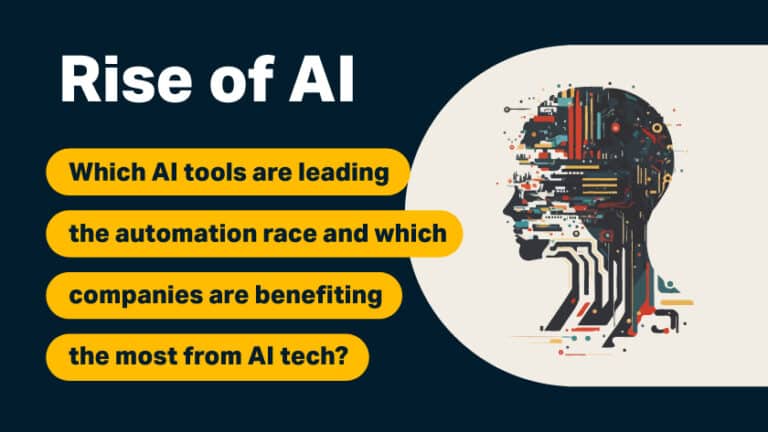
Rise of AI
Which AI tools are leading the automation race and which companies are benefiting the most from AI tech?
There has been a big increase in the number of AI tools becoming available recently, including the likes of ChatGPT and PyTorch.
Artificial intelligence can be used for a whole range of reasons across various different industries, from global mass payments and ap automation within the finance industry to traffic management and self-driving vehicles within the transportation industry. But which AI tools are leading the automation race and which companies are benefiting the most from AI tech?
We’ve compiled a list of AI tools before ranking each one based on Google search volume, Twitter followers, Linkedin followers, G2 review scores, and pricing, to determine the leading companies and programs in the world of AI.
ChatGPT Tops the List of the Best AI Tools
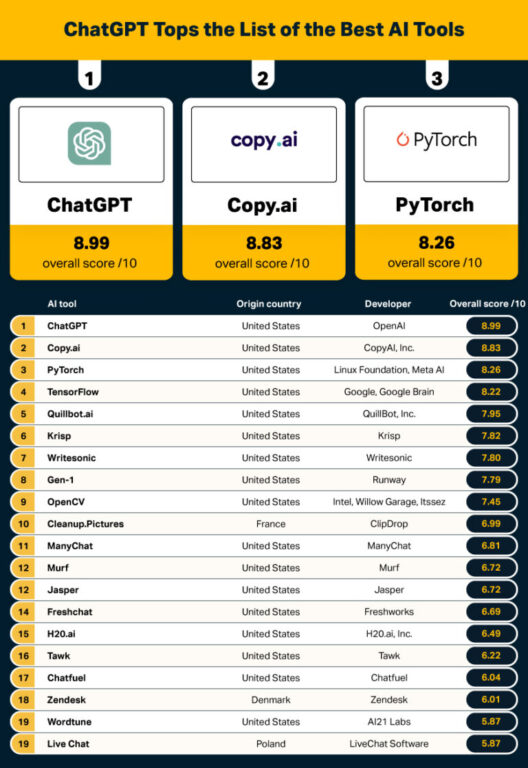
1. ChatGPT – 8.99 overall score
Taking the top spot with an overall score of 8.99 is ChatGPT, a chatbot created in the US by OpenAI that enables users to have human-like conversations with the technology. By using the language model, ChatGPT is able to answer questions and assist with tasks, such as writing emails, essays, or pieces of code.
ChatGPT was the most searched AI tool on Google over the past year, and currently has over 120,000 followers on Twitter and almost 19,000 followers on Linkedin. The tool has a review score of 4.7/5 on G2, with one user saying that it makes them feel as though they have an “endlessly creative assistant”. Although the tool operates on a pay-per-token system, there is the option to upgrade to ChatGPT Plus for $20 per month.
2. Copy.ai – 8.83 overall score
In second place with an overall score of 8.83 is US-based tool Copy.ai, a copywriting tool that is used by businesses to generate high-quality copy so that they are able to write blogs faster, write higher converting social media posts, and more engaging emails.
Over the last year, the tool was searched for over 5.5 million times on Google and has generated over 55.7 thousand followers on Twitter and almost 14,000 followers on Linkedin. On G2, users have rated Copy.ai 4.8/5, with 147 five-star reviews. Users can access the tool for free but also have the option to upgrade to a pro account for $36.
3. PyTorch – 8.26 overall score
Coming in third with an overall score of 8.26 is PyTorch, an American machine learning framework created by the Linux Foundation and Meta AI, that is used for computer applications, such as natural language processing and computer vision.
The tool, which is completely free, has 318,400,000 Twitter followers and almost 160,000 Linkedin followers, as well as being searched over 2.9 million times on Google since April 2022. PyTorch has a score of 4.5/5 on G2, with users praising it for its choice of data types and selection of model architecture, which is great for AI beginners.
ChatGPT is the Most Searched AI Tool on Google
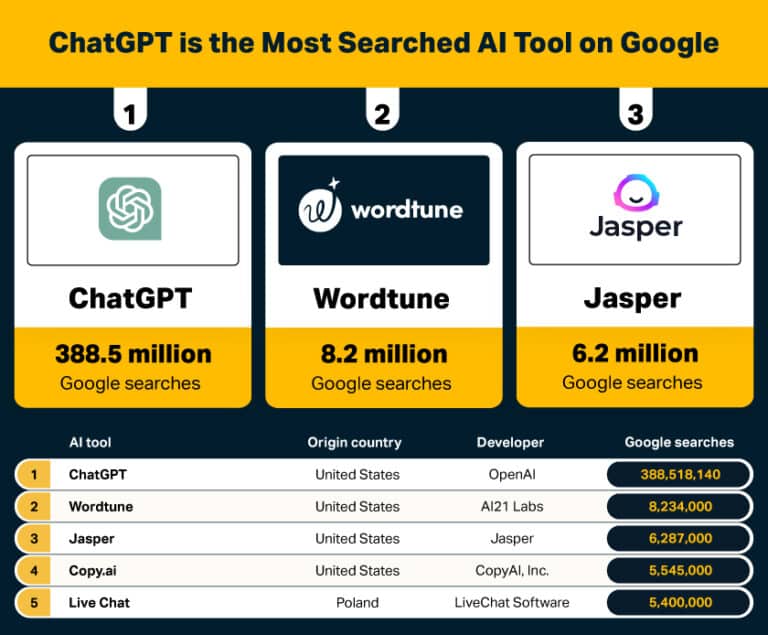
1. ChatGPT – 388.5 million Google searches
Storming to the top of the list with over 388.5 million Google searches is ChatGPT, the sibling model to InstructGPT. The tool interacts in a conversational form, with the dialogue format allowing it to answer followup questions, reject inappropriate requests and rectify mistakes.
On the G2 user ratings, ChatGPT scores 9.6/10 for ease of use, 8.4/10 for quality of support and 9.5/10 for ease of setup.
2. Wordtune – 8.2 million Google searches
The AI tool with the second highest number of Google searches is Wordtune, which was developed in the US by AI21 Labs, and assists in rewriting and rephrasing pieces of text. It has many purposes, such as helping you to convey a more casual or serious tone, as well as shortening or expanding your writing.
As well as 8,234,000 searches on Google, Wordtune also has 4,065 Twitter followers, 3,508 Linkedin followers, and a review score of 4.3/5 on G2.
3. Jasper – 6.2 million Google searches
In third place, with over 6.2 million Google searches, is Jasper, an American AI tool that helps businesses tailor their content to their brand at a quicker pace. It has many features, including surfer SEO integration, which writes content that is keyword optimized for page one rankings on Google, as well as being able to read and write content in over 29 languages.
The AI tool has a total of 12,700 followers on Twitter and 20,816 followers on Linkedin, as well as a review score of 4.7/5 on G2.
TensorFlow is the AI Tool with the Most Twitter Followers
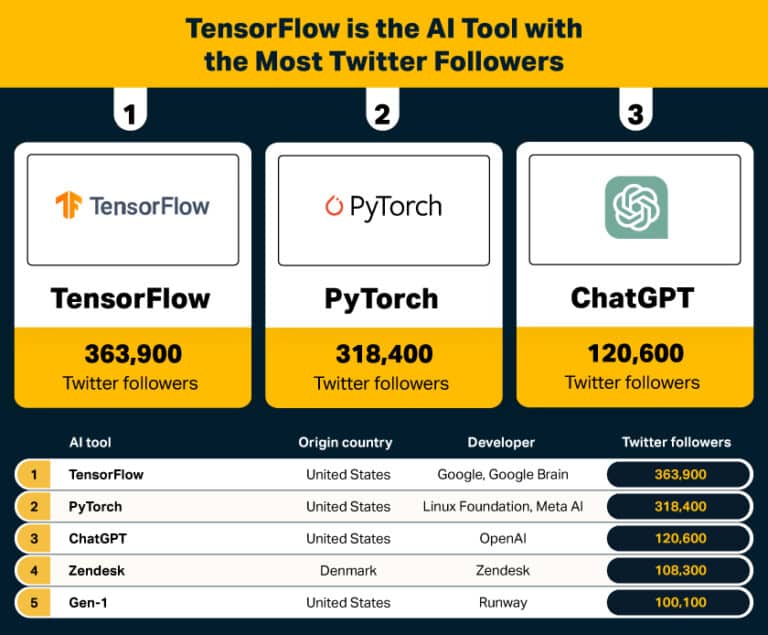
1. TensorFlow – 363,900 Twitter followers
Taking the top spot is TensorFlow, which has a total of 363,900 followers on Twitter. The US-based AI tool was developed by Google and Google Brain, and has a regular competition on its account called #TFCommunitySpotlight, which highlights the apps and tools that people have successfully created by using TensorFlow.
2. PyTorch – 318,400 Twitter followers
PyTorch has the second-highest number of Twitter followers, standing at 318,400. A range of tweets are posted to the account, including details of both virtual and in-person meetups, key features of the tool, and how to use ad-ons to further your experience with PyTorch.
3. ChatGPT – 120,600 Twitter followers
In third place is ChatGPT, whose Twitter follower count stands at 120,600. ChatGPT’s tweets mainly revolve around the tool’s updates, as well as retweets of people’s tips on how to use the tool, particularly those of Travis Fischer, who worked on the creation of ChatGPT.
Freshchat is the AI Tool with the Most Linkedin Followers
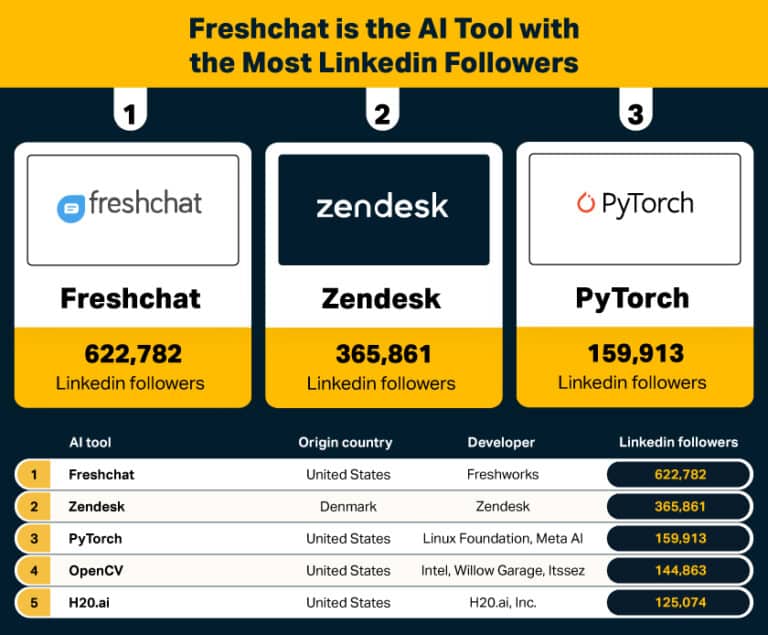
1. Freshchat – 622,782 Linkedin followers
Storming to the top of the list with 622,782 Linkedin followers is Freshchat, an American AI tool created by Freshworks, that enables you to have conversations at scale with your customers. There is a variation of posts on the account, including insights from company leaders, glimpses into events that the team has attended, and tips on how to create a successful work culture.
2. Zendesk – 365,861 Linkedin followers
The AI tool Zendesk, which originated in Denmark, has the second-highest number of Linkedin followers, standing at 365,861. The account has a variety of posts, including new blog uploads, upcoming events, top tips on how to successfully use AI tools, and ways you can use Zendesk to your advantage.
3. PyTorch – 159,913 Linkedin followers
In third place is PyTorch, which has almost 160,000 Linkedin followers. PyTorch’s Linkedin posts are generally the same as those on Twitter, however, the tool’s engagement rate is a lot higher on Linkedin. For example, the account received almost 800 reactions to a post about Hidet, a deep-learning compiler that can be used alongside PyTorch.
The Most Highly-Rated AI Tools
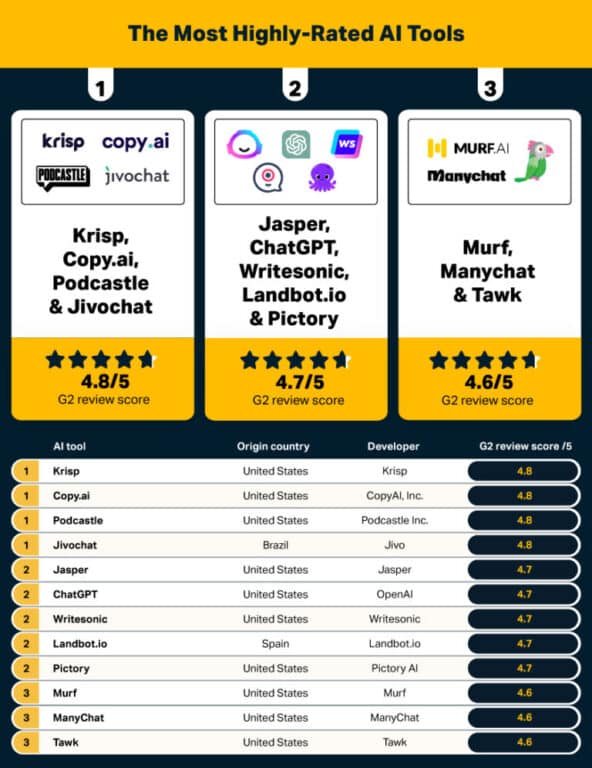
1. Krisp, Copy.ai, Podcastle & Jivochat – 4.8/5 G2 review score
Taking the top spot for the highest scoring AI tools on G2 are US-based companies Krisp, Copy.ai and Podcastle, and Brazilian company Jivochat, which all have a review score of 4.8/5. Krisp, an audio processing AI tool, has 532 reviews on G2, 86% of which are five stars. Some users have even dubbed it the “best noise cancellation app on the market”.
2. Jasper, ChatGPT, Writesonic, Landbot.io & Pictory – 4.7/5 G2 review score
The AI tools with the second highest review score on G2 are US-based companies Jasper, ChatGPT, Writesonic and Pictory, and Spanish company Landbot.io, which all receive 4.7/5. Writesonic, an AI tool that creates SEO-friendly content for blogs, ads, and online shops, has over 1,700 reviews on G2, 87% of which are five stars. Some users have even dubbed it “a magical app” and “a game changer”.
3. Murf, Manychat & Tawk – 4.6/5 review score
In third place are the American AI tools Murf, ManyChat, and Tawk, which all receive a review score of 4.6/5 on G2. Tawk is an AI tool that allows users to do various things, such as monitor and chat with visitors on their website, respond to support tickets, organize contacts, and create a help center. The tool has 171 reviews on G2, 77% of which are five stars. Some users have even dubbed it as the “best live chat solution for every business”.
The Cheapest AI Tools Available on the Market
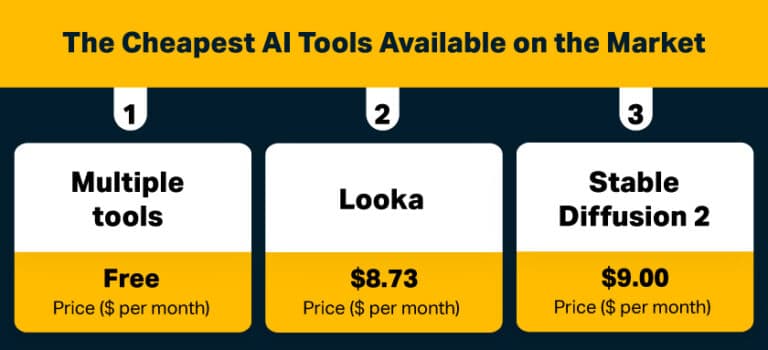
1. Multiple tools – Free
Of the 45 AI tools that we analyzed, 26 of them provide free options for users, including the likes of OpenCV, Chatfuel, Fireflies, Soundraw, and Wit.ai. Some of these tools also have the option to upgrade to pro accounts for various prices. This enables users to access more features of the tools, including more conversations on Chatfuel, unlimited transcription credits on Fireflies, and up to 50 downloads on Soundraw.
2. Looka – $8.73 per month
The second cheapest AI tool is Canadian-based company Looka, a piece of software for logo design and brand identity. An annual brand kit subscription will cost users £84, which is equal to approximately $105, meaning that you will be paying around $8.73 per month. This includes features such as unlimited changes to your logo, hi-res and vector logo files, and over $3,000 in exclusive offers.
3. Stable Diffusion 2 – $9.00 per month
The third cheapest AI tool is Stable Diffusion 2, which was developed by Stability AI, and is a diffusion-based text-to-image generation model which can be used to generate and modify images based on text prompts. Subscriptions to Stable Diffusion API start at $9.00 per month for a basic plan, which provides access to 999 image generations and is best for either personal or freelance work.
Over 50% of AI Tools Developed in the United States
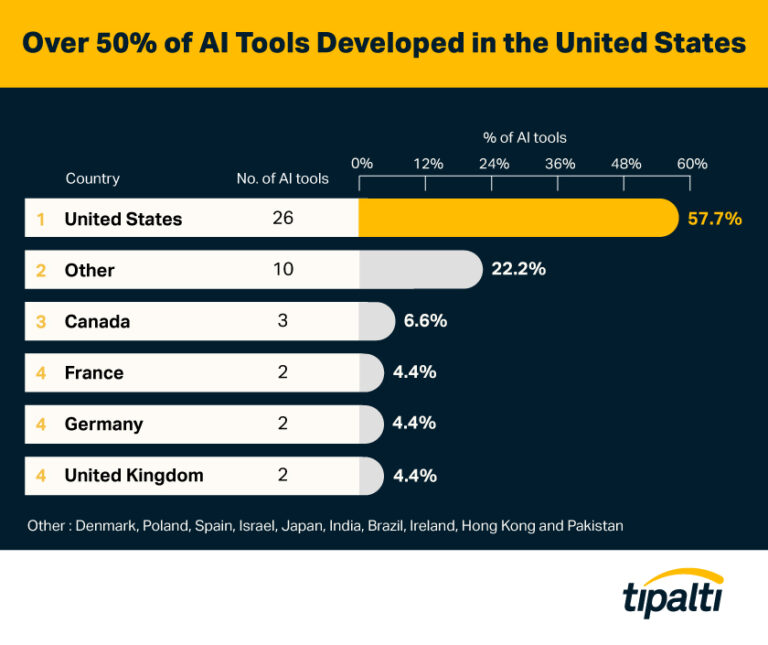
There are such a wide range of AI tools available now that people are often left wondering where these weird and wonderful ideas actually originate from. Of the 45 AI tools that we analyzed, 57.7% of them were developed in the United States, including the likes of ChatGPT, Freshchat, Pictory, Genesys and WordAi.
Over 22% was made up by ‘other’ countries, such as Zendesk, which originated in Denmark, Live Chat, which was developed in Poland, and HitPaw, which was created in Hong Kong. Canada is responsible for the development of 6.6% of our chosen AI tools, including Lumen5, Looka and Meya AI.
France, Germany and the United Kingdom then made up the rest of the table, accounting for 4.4% each, with Cleanup.Pictures and ItsAlive originating in France, Userlike and Lalal.ai being developed in Germany, and EBI.AI and Flick being created in the UK.
Methodology:
We began by compiling a list of AI tools using sources such as Neil Patel, Influencer Marketing Hub, HubSpot, Forbes, and Unite.ai.
We then gathered each AI tool’s social media follower count from Twitter and Linkedin. All data is correct as of 28th April 2023 and therefore, follower counts may now differ.
We also used Google Keyword Planner to gather the number of Google searches for each AI tool between April 2022 and March 2023.
We used the business software review site, G2, to gather the review scores of each AI tool. Scores were not available for the following tools: Quillbot.ai, Gen-1, Cleanup.Pictures, Deep Nostalgia, Soundraw, Lalal.ai, Stable Diffusion 2, EBI.AI, Flick, and Meya AI. All data is correct as of 28th April 2023 and therefore, review scores may now differ.
We also visited the website of each AI tool in order to find out their cost. This included looking at whether each tool could be downloaded for free or not, as well as seeing if there is the option to upgrade to a pro account for an additional cost. ChatGPT runs on a pay-per-token system and therefore wasn’t comparable for price data.
For the overall score, we ranked each AI tool based on the factors mentioned above. We gave each factor a normalized score out of 10, before taking our final overall score as an average across all factors. Due to no review scores being available for the previously mentioned tools, this factor was left out of the overall score for these specific tools. In addition to this, ChatGPT received no score for pricing as the data wasn’t comparable, as previously mentioned.